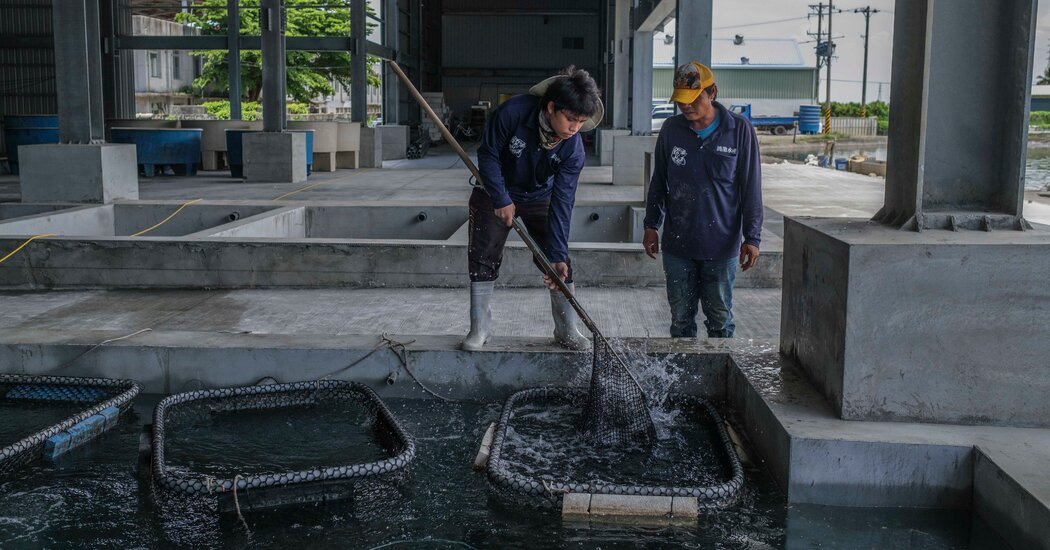
FANGLIAO, Taiwan — Lin Chun-lai bought his grouper farm in southern Taiwan about a decade ago with an eye on mainland China’s growing appetite for live fish. In just a few years, the former electrician made enough money to comfortably support his family of four and even open a small inn.
Then China abruptly banned all imports of grouper from the island, in an apparent attempt at turning the economic screws on Taiwan, a self-governed island that Beijing claims as its own territory. The move cut Mr. Lin and other farmers like him off from their main market, putting their livelihoods at risk and dealing a huge blow to a lucrative industry.
“If I don’t farm groupers, what else can I do to live?” Mr. Lin asked on a recent morning as he stood on a short concrete wall looking out at the 2.5 acres of water, divided into pools, in which he is raising more than 70,000 fish. The groupers were ready for harvest, but since the ban took effect a week ago he has not received orders from fish traders who would normally be calling at this time of the year.
Chinese customs officials said they had found banned chemicals and excessive levels of other drugs in grouper that had been recently imported from Taiwan. Officials in Taiwan have pushed back, arguing the ban was politically motivated. The island’s president, Tsai Ing-wen, has vowed to help grouper farmers.
China’s leader, Xi Jinping, has said Taiwan’s unification with China is inevitable, but most of Taiwan’s 23 million people are in favor of maintaining the island’s de facto independence. As Beijing has ramped up pressure on the island, Taiwan has moved to strengthen economic and diplomatic ties with friendlier countries, including the United States, those in the European Union and Japan.
In recent years, Beijing has sent military aircraft toward the island almost daily. It has tried to isolate Taiwan, peeling off its few remaining diplomatic allies and blocking it from joining international organizations. It has also increasingly sought to restrict the island’s access to China’s vast consumer market, banning Taiwanese pineapples, then wax apples, last year after it said the fruits brought in pests.
Taiwan has sometimes been able to blunt the impact of such measures. The public quickly rallied to support the island’s pineapple farmers. Restaurants raced to introduce menus featuring pineapple-centered culinary creations, politicians posted photos of themselves eating “freedom pineapples” on social media and government departments encouraged public servants to eat more of the thorny fruit. Countries like Japan stepped in to help make up for the shortfall by increasing their imports of the island’s pineapples.
“Thanks to the support of the Taiwanese people, our business thrived even more than before,” said Hsieh Kun-sung, 61, a pineapple farmer in the southern city of Kaohsiung.
But for Taiwan’s grouper farmers, pivoting away from the Chinese market may not be as easy. Last year, 91 percent of grouper exports, worth more than $50 million, went to China, according to Taiwanese government data. The fish, which is known for its lean and moist meat, is regarded in Taiwan as a relatively high-end seafood typically eaten on special occasions, unlike pineapple. Since China’s ban, the price of one type of grouper has already fallen to $3.30 per pound from $4, according to Mr. Lin, the grouper farmer.
Logistics are also a problem. Most of the grouper farmed in Taiwan is sold live to China, where customers generally prefer to eat fresh fish that is cooked shortly after it is killed. Shifting to markets farther afield would require using what logistics businesses call “cold chain,” a system of refrigerated or frozen transportation and storage of perishable products, which brings added costs. While there has been a slight uptick in interest from domestic customers and Japanese buyers in recent days, several grouper farmers said their phones had been unusually silent.
“It’s easy to transport live fish to China,” said Kuo Chien-hsien, an assistant professor at the department of aquatic biosciences at National Chiayi University. “So now if you suddenly want to change the model, it is actually very difficult.”
The latest ban is an acute reminder to Taiwan of the risks of being overly economically dependent on the mainland. Trade between the sides has grown over the past decades, especially under the previous administration in Taiwan, when relations were friendlier.
In 2010, Beijing and Taipei reached a landmark trade deal that cut tariffs on various products, including grouper, and many Taiwanese fish farmers raced to grow their stock of the fish, which can take up to five years to cultivate. By the time Chen Chien-chih, 50, took over his family’s fish farming business in the plains of southern Taiwan five years ago, groupers were already one of the company’s main exports.
But Mr. Chen and his wife, Pan Chiung-hui, 48, grew concerned as they watched China place successive bans on other products that had been on the list of exports eligible for reduced tariffs, including pineapples and wax apples. Their fears only deepened last year when China announced the discovery of some chemicals in a batch of grouper imported from two Taiwanese farms.
The couple raced to sell. By the time the ban was announced this month, they had already sold half of their 6,000 fish, mostly to local fish traders and customers.
“We’ve been trying hard to diversify,” Ms. Pan said in an interview at her farm, alongside a verdant mountain range. “But it was not enough. We still rely greatly on the Chinese market.”
The Latest on China: Key Things to Know
In recent days, Taiwanese agricultural authorities have contacted grouper farmers to discuss ways that the government can help, including by providing low-interest loans and feed subsidies and expanding access to domestic consumers and overseas markets. Another idea being floated is to include the fish in individually packaged meal boxes sold at train stations and on trains by Taiwan’s railway administration. Taiwan’s Fisheries Agency said on Tuesday that the agency would spend more than $13 million to support the grouper industry.
Taiwan’s Council of Agriculture has said it would consider filing a complaint about the grouper ban to the World Trade Organization. Lin Kuo-ping, the deputy director general of the official Fisheries Agency, said the government had reached out to their Chinese counterparts to discuss the inspection process but had not heard back. China’s General Administration of Customs did not respond to an emailed request for comment.
Some grouper farmers said that if the ban was not lifted, they would have to settle for selling the fish on the domestic market at a huge loss. Until then, the fish will remain in the ponds. Mr. Lin, the grouper farmer, said he worried the groupers could die as a result of overcrowding.
He is now pinning his hopes on another kind of fish that he has been farming, the four-finger threadfin fish, which is also popular on the mainland. But he acknowledged that even this backup strategy was vulnerable to geopolitical shifts. Last year, Taiwan’s exports of the fish were worth nearly $40 million — and more than 70 percent went to China.
“Our biggest customer,” he said, “is still China.”




